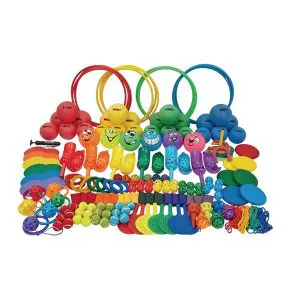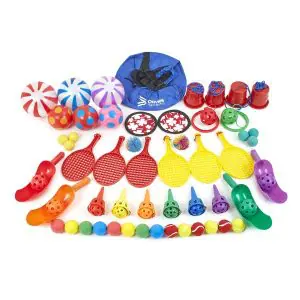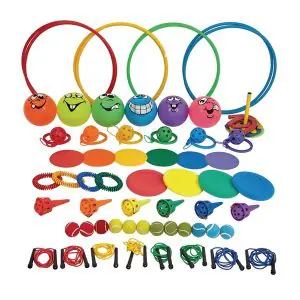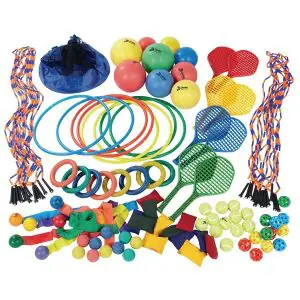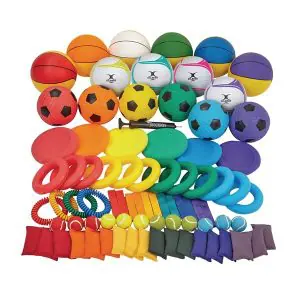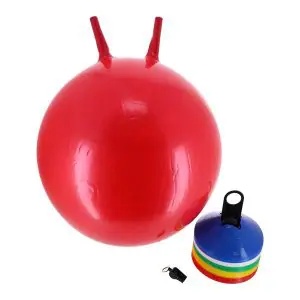No products in the basket.
In 2024, as a lunar leap year unfolds alongside a sports gathering in Paris, the stage is set for a momentous athletic event. This presents an excellent opportunity to elevate the significance of your school’s sports day and truly celebrate its intrinsic value.
Too often, both secondary and primary school sports days are seen as just that – a day. A day’s sports performance, with the sporty students loving every minute and raking in the medals, whilst the less sports inclined are coaxed and cajoled into reluctant participation and massive relief when it is all over.
It doesn’t have to be that way – and this is the year to change your sports day for the better.
After all, athletes do not just turn up every four years on a wish and a whim…

Michael Phelps (professional swimmer; 17 medals) told CNN that he practises every single day in the pool for three to six hours, doing separate exercises on dry land four to five days a week. Similarly, Jessica Ennis-Hill (Athletic Track and Field) advises that, ‘To be the best and stay at the top of your sport takes an incredible amount of effort and dedication.”
However, this does NOT mean that sports day should turn into an excuse for boot camp and enforced, intense fitness training for all. No – it actually means that all the multiple benefits of a school sports day should be maximised. Preparing for an international sporting event and preparing for sports day have much in common! So, what are the core and periphery advantages for all your students and pupils of your school making the most of sports day and bringing it into focus earlier than usual?
Personal Goals and Personal Bests
This is your chance to make sports day totally inclusive and something for everyone to look forward to. Of course, it is a competitive event but you can turn this to be either competitive between participants or for students to challenge themselves. Nothing should detract from the thrill of the race and the potential win for the sports-orientated, mentally resilient and physically-capable students. Sports day is a vital opportunity for them to reap the rewards of their training and talent; possibly a stepping stone to even greater sporting achievements.
But sports day can become just as exciting and rewarding for the less confident, least able or sports adverse pupils too. It’s all about positive attitude and visualisation.
If you start now, these students can plan personal goals to work towards that could reach their climax and reward at sports day. Just participating in a team, completing a whole track lap, jumping a personal best high jump or managing to throw the javelin in a straight line are all worthy of a certificate and recognition at sports day.
Changing attitudes amongst pupils, students, staff and parents about the fundamental value of sports day may take some time but so worthwhile in the longterm. Time to start sowing the seed of personal goals and personal best ambitions now.
Given a clear training schedule that suits their individual capabilities, pupils and students will come to realise that getting whatever they want in life requires practice, commitment, determination and focus. In general, good things don’t just happen; we need to decide what we want to achieve, focus on it, and work for it.
If you raise the profile of your summer sports day now, help your students to set their personal goals and design a schedule to help them to achieve these on sports day, then they stand a good chance of sports day success – and an appreciation of how planning and dedication can help in all aspects of their lives.
Sleep, Nutrition and Fitness
Once all your pupils and students realise that they have a significant contribution to make to sports day (whether this be serious, public competition or private, individual improvement), they can be encouraged to follow better lifestyle choices in general. Time to introduce useful discussion on the value of sleep, healthy nutrition and better fitness… for both mental health and physical restoration.
Bit by bit, even previously resistant Student X may begin to turn that mobile phone off at night time, come off screen to have a slightly earlier bedtime, replace chips with salad occasionally or walk the walk instead of driving everywhere! Worth a try.
Support, Teamwork and Mental Resilience
With a personal sports day goal in mind, a teacher who is interested in each individual’s journey, and a training schedule to match, pupils and students will begin to realise that success is ultimately down to more than one person.
Friends can help each other to practise their skills; students who did not previously interact may now do so as they recognise how they can help each other work towards common goals; arch sporting rivals may tone down the antagonism and turn it into mutually advantageous training partnerships.
As such relationships develop and solidify, your pupils and students will begin to feel their value as a member of the school community, all of whom are working towards the same goal of a successful and enjoyable sports day. This sense of being part of something can engender an equal sense of ‘belonging’.
Overall, it is clear that sports day has so much more to offer than one date in a busy school calendar – but it has to be thought about and worked on as early as possible to reap more rewards than just who crosses the finishing line first. Taking a more holistic, embedded approach could indeed make your school sports day 2024 a leap ahead of the rest.
What events should a Sports Day include?
There’s no set list of sports that have to be included in Sports Day.
What’s right for you depends on the individual needs of your pupils, as well as the space and equipment available for your event.
That said, if you’d like some ideas, then here’s a list of some popular sports day activities:
- Sprint Race—This one shouldn’t require too much explanation. After all, it’s a straight-up race to the finish line. The fastest runner wins.
- Relay Race—Try encouraging cooperation by having your children work together in this event. You could offer a prize to the best team, as well as the winners.
- Shot Put—This one’s pretty straightforward. Whoever can throw a chosen object (a bean bag is ideal for younger children) to the furthest point wins.
- Long Jump—In the absence of a sandpit, you might want to try making this a standing-only event. You can mark each child’s effort with something like a cone.
- Tug of War—Another event that’s perfect for encouraging teamwork. There’s also no reason why this couldn’t involve mixed-gender teams if that’s something you’d like to explore.
- Egg and Spoon Race—Slow and steady wins the race. It might be wise to leave this event until last, just in case you don’t fancy having a big mess on your hands!
- Teachers’ (or Parents’) Race—The final event we’re recommending is all for the enjoyment of spectators. After all, sports day’s all about having fun. Isn’t it?
Inclusive, Alternative Sports Day Ideas!
Fun at the Seaside. On a 50 metre running track, you will need to lay out a rubber ring for each pupil on the 10 metre line, a pair of armbands each on the 20 metre line, a mask and snorkel each on the 30 metre line and a beach ball on the 40 metre line. Each child should start the race wearing a pair of flippers and collect and put on each of the additional items as they run. Hopefully this will lead to a lot of laughter for the spectators.
Balloon Squeeze. Another task that requires good teamwork; in pairs, pupils must get a balloon to the end of a 50 metre track by squashing it between their chests or tummies. They must not use their hands or feet to move the balloon and if they drop it they will have to go back to the beginning.
Bucket Head Challenge. This race is perfect for a hot summer day. Each pupil needs to hold a bucket of water on their head whilst completing a tricky obstacle course, including going over hurdles, jumping through hoops and limbo-ing under horizontal poles. The winner is NOT the person who completes the course the quickest but the pupil who has the most water left in their bucket at the end.
Car race. For younger children the plastic red and yellow little tikes cars are fab! It is an object that most students will be familiar with. All you need is 3 or 4 cars. For students with physical impairments it is a great way for the staff to get involved and join in the race by pushing the students along. On your marks, get set, go!
Dress up course. Try something new and instead of bean bags or spoons, have four-five items of clothing laid out one after another, from hats and glasses to shoes and scarves. At each stage have a mirror, so the student can see themselves. I used to practice this in music group, allowing each student to pick one item at a time and look at themselves in the mirror. It was a great race that everyone enjoyed.
Sports Day Ideas for Everyone to Enjoy!
- Obstacle courses with a beanbag on your head
- Hold a funny balance for the longest
- Tug of war
- Race to complete a giant puzzle
- Who can ride a bike slowest across something
- Who can bounce a tennis ball the most times in a row on a racket

